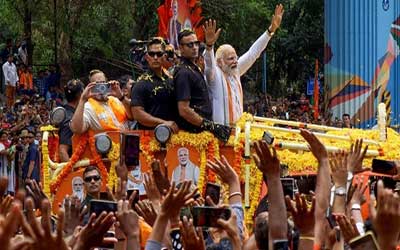Date: 20/05/2023
Relevance: GS-2: Appointment to various Constitutional Posts, Powers, Functions, and Responsibilities of various Constitutional Bodies.
Key Phrases: Provided free airtime on public broadcasters, Representation of People Act, 1951, The Secretary, Ministry of Information and Broadcasting vs Cricket Association of Bengal and ANR (1995), Federal Communications Commission, fairness doctrine, Content Vetting, Fairness, Conflict of Interest and Decision Review.
Why in News?
- In the recently-concluded Karnataka Assembly elections, political parties were provided free airtime on public broadcasters, All India Radio (Akashvani), and Doordarshan during elections.
- This initiative aimed to promote fairness and equal opportunities for political parties to convey their messages to the public.
The Rationale of the Scheme:
- Ensuring Fairness and Public Good:
- The provision of free airtime for political parties during elections is supported by the 2003 amendment to the Representation of People Act, 1951, which gives it a legal basis.
- The Supreme Court's influential judgment in the case of The Secretary, Ministry of Information and Broadcasting vs Cricket Association of Bengal and ANR (1995) affirmed that airwaves are public property and should be utilized for the greater public good.
- Governments worldwide are concerned about preventing the misuse or abuse of airwaves for gaining unfair electoral advantages.
- Examples from Other Countries:
- In the United States:
- The Federal Communications Commission, responsible for regulating electronic media, introduced the fairness doctrine to ensure equitable electioneering on the airwaves.
- The fairness doctrine required broadcasters who carried political content from one candidate to extend the same opportunity to other candidates in the electoral contest.
- Although the fairness doctrine is no longer in effect, it highlights the importance of fairness in broadcasting during elections.
- In the United Kingdom:
- Parliament allocates designated slots called party political broadcasts (PPBs) for political parties to convey crucial political information to the public.
- The British communication watchdog, Ofcom, ensures that PPBs are included in all licensed public service television channels and commercial radio services.
- Other countries:
- Singapore, Brazil, and Japan have also implemented similar requirements to promote fair and informative political broadcasts.
- In the United States:
What is the working of the scheme?
- Transparent Allocation of Broadcast Time:
- Time vouchers are distributed through a transparent lottery system by the Election Commission, eliminating preferential treatment in obtaining prime-time slots.
- Content Vetting and Fairness:
- Transcripts of political parties are carefully vetted to ensure compliance with relevant codes.
- These codes prohibit content that criticizes other countries, attacks religions or communities, incites violence, or involves personal attacks.
- Disputes over vetted script content are resolved by an Apex Committee comprising members from Akashvani and DD, with their decision being final.
- Diversity in the Electoral Process:
- In the Indian media landscape, where media houses are often associated with political parties, state-sponsored airtime brings diversity to the electoral process.
- Adherence to specific codes ensures fair play and promotes equal opportunity.
- Platform for Debates and Criticism:
- Guidelines from the Election Commission of India (ECI) stipulate that a maximum of two-panel discussions must be aired by Akashvani and DD.
- These discussions serve as a platform for parties, regardless of their size, to engage in debates, criticize each other's policies and manifestos, and foster an informed citizenry.
Operational Challenges:
- Equitability and National Recognition:
- The inclusion of national and recognized State parties in the scheme may raise concerns about its true equity, especially given recent retractions of national party status for the Nationalist People's Coalition (NPC) and the Trinamool Congress (TMC).
- However, the Election Commission of India (ECI) faces practical constraints and acknowledges the finite nature of airwaves.
- Conflict of Interest and Decision Review:
- The Apex Committee, consisting of officials from Akashvani and DD, may face conflicts of interest when reviewing their own decisions in case of conflicts with political parties over the content.
- Establishing a more representative committee could address this concern.
- Extending Coverage to Private Broadcasters:
- Calls have been made to extend the scheme’s provisions to cover private broadcasters, similar to the fairness doctrine in the United States.
- This could involve mandating designated slots for private channels to broadcast content equitably, providing a platform for smaller parties and candidates.
- Clear differentiation between political broadcasts and regular news programs is also suggested.
Conclusion:
- As the media landscape becomes increasingly focused on attention-grabbing tactics during elections, the use of airwaves becomes crucial in nourishing and enriching Indian democracy.
- The 2024 General Elections are anticipated to witness unprecedented levels of electioneering in the media.
- In this context, it is vital to prioritize spaces for sober, fair and considered debates that promote the exchange of ideas, informed decision-making, and a deeper understanding of political policies and manifestos.
Source: The Hindu
Mains Question:
Q. Discuss the rationale for providing free airtime to political parties during elections in India. Examine the challenges faced in ensuring equitability and democratic discourse through this scheme.







